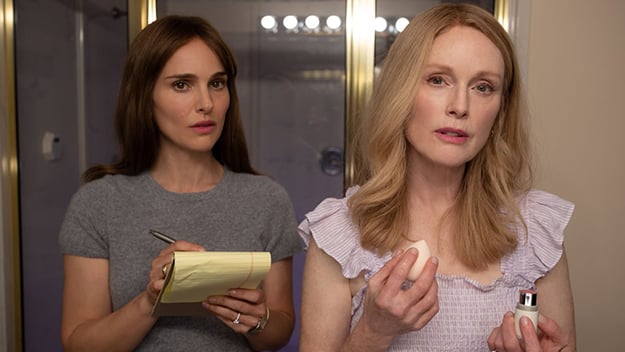Mirror, Mirror
This article appeared in the September 28, 2023 edition of The Film Comment Letter, our free weekly newsletter featuring original film criticism and writing. Sign up for the Letter here. Read and listen to all of our coverage NYFF61 here.

May December (Todd Haynes, 2023)
One of my great pleasures in recent years has been watching Todd Haynes move gradually from pastiche and deconstruction (however gorgeously crafted) toward a more realistic and emotionally involving aesthetic, without sacrificing any of his intellectual edge. I never quite got the rhapsodic response to Far from Heaven (2002). Not that this postmodern Sirkian melodrama is without emotional payoff—the relationship between Julianne Moore’s ’50s housewife and Dennis Haysbert’s Black gardener is grounded in a yearning all the more powerful for being ambiguous and unconsummated. But was anyone ever quite as clueless and inarticulate as Moore’s Cathy? With that film’s sumptuous color scheme and the swooning Elmer Bernstein score, Haynes signals feelings that never quite inhabit the figures on screen as they do in Sirk’s movies. The subordinate characters in those postwar melodramas might be snobby, pinched, and hypocritical, but they weren’t boring automatons. Their counterparts in Haynes’s update smack of condescension; the brittle two-dimensionality of the white suburbanites plays as parody while the Black characters possess a tonal resonance and dignity that puts them in a different film.
Haynes’s later narrative projects—particularly Carol (2015), Mildred Pierce (2011), and now May December—are all masterworks in different but distinctly Haynesian ways. The director still plays with matters of class and identity in these, but in ways both subtler and more challenging. The inexorable presence of class and the endless mystery of identity impinge on one another, forming a kind of shifting, interlocking, almost musical pattern. He’s also proving to be one of the great modern directors of women—of women who go out on a limb (or were born that way), and who must continually find their footing. The sleek blonde protagonist of Carol, played by Cate Blanchett, is so apparently self-possessed, while her unplaceable younger lover, Therese (Rooney Mara), seems “flung out of space.” Kate Winslet’s status-conscious heroine in Mildred Pierce is intimidated by her snooty daughter (Evan Rachel Wood), yet sheds her lumpenness in lit-up delight when she discovers her sexuality with Monty (Guy Pearce).
In the mordant melodrama May December, an actress, Elizabeth (Natalie Portman), has come to Savannah, Georgia to study the subject of the tabloid story she’s about to bring to the screen—a woman (Julianne Moore) knee-deep in the still-transgressive relationship she started 20 years earlier with a seventh-grade student, whom she married after a stint in prison. The two women’s darkly funny dance of vampire and sphinx, would-be manipulator and elusive subject, takes on echoes of Persona. In one scene they look at the camera/mirror as Moore’s Gracie applies her own makeup to Elizabeth, and the two seem to merge. In Haynes’s films the act of looking (and we are not always sure who is looking at whom) introduces a note of uncertainty—glass and mirrors are essential to his visual grammar. Women constantly consult their own reflections, sometimes glancingly and sometimes probingly, as if to ask, “Who am I to myself; who am I to others?” The two actresses are extraordinary: Moore richly opaque, Portman slyly disingenuous. They manage the paradox of letting us see and somehow grasp women who are impenetrable.
With its Spanish moss and laid-back lifestyle, Savannah (or “Slow-vannah,” as one denizen calls it) is not the place where you expect to find such an unconventional family, but it is perhaps the place where a stigmatized housewife would still be receiving packages of shit in the mail for something that happened decades before. Visually there is nothing particularly off-key in the film’s opening on Gracie’s spacious house and party-ready backyard, but there’s a dark thrum in the score (composed by Marcelo Zarvos and brilliantly adapted from Michel Legrand’s music for The Go-Between), an upward-downward motif with rippling yet ominous piano chords, suggesting that something fateful has already happened. The palette is closer to that of Mildred Pierce—all burnished golds, browns, and greens—but with a comfy outdoorsy vibe and decidedly lavish locales compared to the Depression-era austerity of that miniseries. Gradually, and casually, the family and friends assort themselves with much overlapping conversation. A cookout is in preparation, with Gracie multitasking in the kitchen while Joe (Charles Melton), her much younger husband, is squeezed into the right edge of the frame almost as an afterthought. What part does he play? We cut to an earlier scene of the couple waking up in each other’s arms as Gracie complains that he’s “stinking up the sheets.” As one would complain to a wayward son.
Before Elizabeth actually appears on screen, we hear various opinions and forewarnings concerning the actress who is about to enter and upset Gracie and Joe’s lives. She does commercials on television. There are nude scenes of her somewhere on the internet. They are nervous (as well they might be) when Elizabeth appears as a study in shy, grateful sobriety. When she and Gracie stand side by side chatting in a flower-arranging class, her vocal pitch even resembles Gracie’s, though her drive to get to the bottom of the woman’s past, beyond the tabloid covers, meets resistance. “No past weighs on me,” Gracie says tonelessly. But maybe they have something in common: the image of the two women surrounded by flowers, that ultimate emblem of suburban femininity, resembles the scene in Carol in which Blanchett and Mara eye each other against a backdrop of department-store dolls, creatures representing the conventional girlhood so alien to both women (though they only half-know it).
But there’s an imbalance, too. Elizabeth has the upper hand, not just as initiator of the project but also socially. She reveals that she is the child of intellectually accomplished parents, while Gracie’s mother just taught her “how to bake blueberry pies”. That’s all that needs to be said for us to understand how differently endowed these two women are. Whatever her mistakes, Gracie is a woman who’s suffered alone, and has had to construct a “normal” life with very little help from others.
Elizabeth pursues her investigation as if this were the role of her career. At one point she appears before a high-school acting class and brazenly discusses the erotics of performing sex scenes, disclosing a facility for turning it off and on at will. She interviews Gracie’s ex-husband, and a New York Times reporter who covered her arrest, but increasingly preys on the naïve and undefended Joe. She goes to the pet store where the original transgression occurred (Gracie ran it and Joe worked for her), heads for the stockroom with its fish tanks and dusty shelves, and acts out the sexual encounter all by herself, orgasm included. She finally gets Joe himself into bed and pretty much devastates him with the callousness of her response, before urging him to get away from his marriage and “make something” of himself.
Even without Elizabeth as provocateur, internal pressures have been building up in Joe and Gracie’s strange family unit. There’s the upcoming high-school graduation of two of their kids (and Joe’s utter desolation at losing them); Gracie’s fat-shaming of her daughter; and the totally disaffected Georgie (Cory Michael Smith), Gracie’s son from her previous marriage, whose life was ruined by his mother’s crime (Joe was his middle-school buddy). In one highly satisfying scene of payback, Georgie corners Elizabeth in a car, and, in his own faux-naïf Hollywoodese, offers her a proposal: that she get him a job as a music supervisor on the upcoming movie in exchange for his memories, his consultation, and his willingness not to go to the press with distressing stories.
In one of those curious accidents of timing, I saw May December the day after I saw Jonathan Glazer’s The Zone of Interest. The latter film takes place in a house adjacent to Auschwitz, where members of a Nazi commandant’s family go about their business like ordinary people, normalizing the horror on the other side of the wall that nevertheless still exists like an underground river, or rumbles in the night that the family has taught itself to ignore. Not to make any kind of comparison between such different phenomena as wholesale murder and domestic horror, but the theme of denial is rendered powerfully in each movie. In May December, it seeps through the cracks and pores, like Joe’s dirt “stinking up the sheets.” Forced by Elizabeth to discuss his relationship with Gracie, Joe asks her point-blank, “What if I was too young?” She turns on him in a rage: “You were in charge.”
Haynes makes us see and feel how we’re doomed to multiple perspectives, mirrors of mirrors, rationalizations woven into memory itself. The “he” that Joe tries to remember is lost or blurred by time and filtered through the retrospective glow of what is now supposedly a happy family. Gracie’s M.O. is to insist on her vision of herself as an optimist, always expecting the best, and then bemoaning that virtue whenever things go awry. Meanwhile, back on the film set, Elizabeth is making it “real” by insisting on another take, then another, then another.
Elizabeth is her own director—Haynes’s surrogate perhaps—and no other director is as attuned to the intricate craft of fakery as he is. Elizabeth has cannibalized Gracie and her family in the name of gathering material, and has transformed that material to get at the “emotional truth.” In other words, her reality. Haynes finds in this uneasy transaction the soft spot in our current discourse on the blurring boundaries between fact and fiction, as in the hybrid species of docudrama and autofiction. Instead of accepting that slippery subtitle, “based on a true story,” we have to ask “whose story?”—without expecting to receive a definitive answer.
Molly Haskell has written for many publications, including The Village Voice, The New York Times, Ms., Saturday Review, and Vogue. She is the author of Steven Spielberg: A Life in Films and From Reverence to Rape: The Treatment of Women in the Movies.







